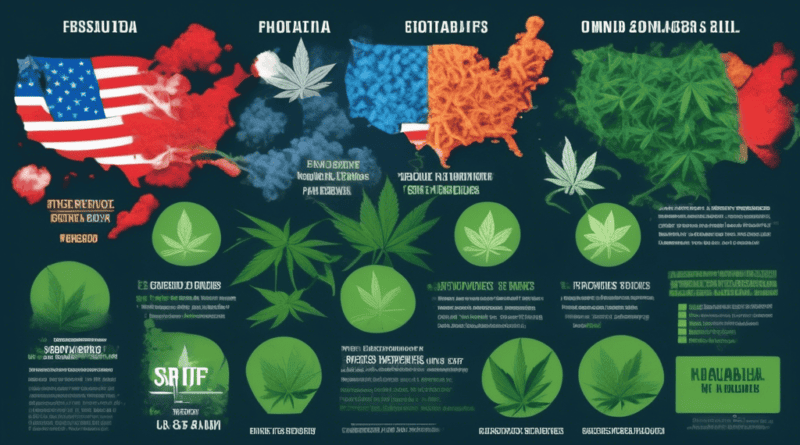Major Shifts and Ongoing Discussions in U.S. Cannabis Policy and Regulation
Recent Developments in U.S. Cannabis Policy and Regulation
The landscape of cannabis policy and regulation in the United States is undergoing significant changes, driven by a mix of federal actions, state laws, and public sentiment. Noteworthy milestones include potential rescheduling of cannabis at the federal level, presidential pardons for possession, and the expansion of both medical and recreational marijuana laws across the country. This article highlights key points from recent developments and ongoing discussions around cannabis policy as of August 22, 2024.
Federal Rescheduling and Presidential Actions
One of the most pivotal current discussions revolves around the rescheduling of cannabis under the Controlled Substances Act (CSA). A recent recommendation from the Department of Health and Human Services to the Drug Enforcement Administration (DEA) suggests rescheduling cannabis from Schedule I to Schedule III, a significant shift that could alter the legal landscape for cannabis-related activities. The DEA is currently reviewing these recommendations, with further developments eagerly awaited by stakeholders.
President Biden has also made headlines by issuing pardons for individuals convicted of simple possession of marijuana at the federal level. This decision aligns with his administration’s broader criminal justice reform agenda and calls on state governors to follow suit. These actions underscore a growing recognition of the need to address past injustices associated with strict cannabis laws and enhance the fairness of the criminal justice system.
State-Level Legislation and FDA Oversight
At the state level, the legal landscape is equally dynamic. As of early May 2024, 38 states, along with the District of Columbia, Puerto Rico, Guam, and the U.S. Virgin Islands, have enacted comprehensive medical marijuana laws. Furthermore, nine additional states have limited-access medical cannabis laws. Recreational cannabis use is now legal in 24 states, in addition to Washington D.C., Guam, and the Northern Mariana Islands. This expanding patchwork of state laws reflects significant shifts in public opinion and legislative priorities.
Regulation of cannabis products by the Food and Drug Administration (FDA) continues to play a crucial role in ensuring consumer safety. The FDA has issued warnings about Delta-8 THC and other safety concerns related to cannabis use. Alongside these regulatory actions, the FDA has approved several cannabis-derived drugs, such as Epidiolex for treating certain forms of epilepsy and synthetic THC drugs for chemotherapy-induced nausea and vomiting. These approvals mark important steps in recognizing the medical potential of cannabis-based therapies.
Research into the medical and therapeutic uses of cannabis is ongoing, though often fraught with regulatory challenges. Obtaining DEA registration and FDA review for research purposes can be complex, but recent legislative efforts aim to streamline this process and promote further scientific exploration. Additionally, public support for cannabis legalization has reached a record high of 70%, reflecting a significant shift in societal attitudes toward cannabis use. The commercial cannabis industry, projected to reach $40 billion in revenue in 2024, stands to benefit substantially from these evolving perceptions and policies.
Despite advancements at the state level and growing public support, federal law enforcement continues to target criminal networks involved in the illegal marijuana trade. This dual approach highlights the complexities of navigating cannabis policy in the U.S., where state-level legalization often contrasts with federal enforcement priorities. As discussions around cannabis policy continue to evolve, stakeholders and policymakers must balance the diverse interests at play to create a cohesive and equitable regulatory framework.

